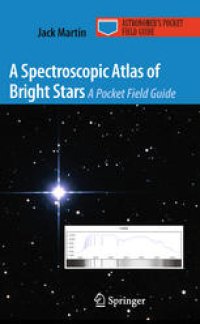
Ebook: A Spectroscopic Atlas of Bright Stars: A Pocket Field Guide
Author: Jack Martin (auth.)
- Tags: Astronomy Observations and Techniques, Popular Science in Astronomy
- Series: Astronomer's Pocket Field Guide
- Year: 2010
- Publisher: Springer-Verlag New York
- Edition: 1
- Language: English
- pdf
Are you ready for a different way of looking at the stars? Do you want to understand more about what you are seeing through your telescope?
Painstakingly researched, with the data compiled over many years by the author (an amateur astronomer for 45 years), this handy user-friendly pocket-sized field atlas contains the spectra (spectral diagrams) of over 73 bright stars in the northern hemisphere and is intended for use by other amateurs, students, and educational institutions as an introduction to the fascinating and important science of stellar spectroscopy.
Professional atlases are far more complex. Until now, nothing was available at an amateur level. This book fills an important gap as the first amateur spectroscopic atlas to be published. The reader will not need to have any prior knowledge of the subject or understanding of complex mathematics in order to use this book. Written in plain English and without difficult equations, it can make the subject accessible to anyone. It can even serve as a guide to the stars at astronomy club meetings or star parties.
Are you ready for a different way of looking at the stars? Do you want to understand more about what you are seeing through your telescope?
Painstakingly researched, with the data compiled over many years by the author (an amateur astronomer for 45 years), this handy user-friendly pocket-sized field atlas contains the spectra (spectral diagrams) of over 73 bright stars in the northern hemisphere and is intended for use by other amateurs, students, and educational institutions as an introduction to the fascinating and important science of stellar spectroscopy.
Professional atlases are far more complex. Until now, nothing was available at an amateur level. This book fills an important gap as the first amateur spectroscopic atlas to be published. The reader will not need to have any prior knowledge of the subject or understanding of complex mathematics in order to use this book. Written in plain English and without difficult equations, it can make the subject accessible to anyone. It can even serve as a guide to the stars at astronomy club meetings or star parties.